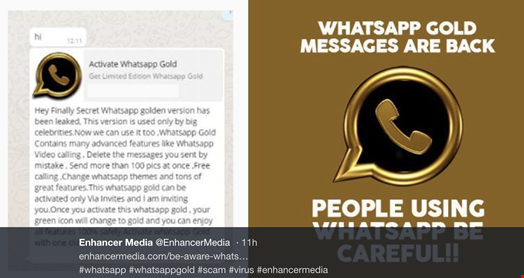A WhatsApp hoax message has reportedly resurfaced, raising concern among users who have received what appear to be different versions of fake chain messages that have been actually circulating for a few years.
Scammers are leveraging the current state of cybersecurity – in which end users are constantly reminded to keep their software updated – with the return of a hoax message promoting a premier WhatsApp service. The message tells users to download a fake update called WhatsApp Gold, according to the Evening Standard.

However, WhatsApp Plus and WhatsApp Gold are not applications developed by WhatsApp. Chain messages related to both of these fraudulent apps as well as the Martinelli virus scam have reportedly been around since 2016 and were deemed hoaxes in 2017. Threats of the malware’s return have resurfaced since the ringing in of 2019. A fraudulent message, the hoax promises users access to enhanced features in WhatsApp if they download the latest "secret" update. However, when users click on the link, they are potentially downloading a malicious software nicknamed WhatsApp Gold, according to Snopes.
Twitter is abuzz with tweets warning users to beware of the fraudulent message. According to Hackers Interview, “This is a malware which could hack into your framework and even degenerate your information. You are instructed to stay away regarding such updates. There is a high likelihood that you will get the message since it has just been circled on a huge scale and it convincingly influences individuals to trust that this is a new version with new highlights.”
The WhatsApp Gold hoax reportedly first circulated by way of a chain message in which users were warned about a forthcoming video containing malware. Snopes reported: “In May 2016, several users of the messaging service WhatsApp reported that they had received an offer to download something called 'WhatsApp Gold.' While the messages varied, they all claimed that users who downloaded the new 'premium service' would get access to extra features, such as video calling and new emojis.”
Still, the Surrey Police have issued a warning on Twitter encouraging users not to click on the message.
